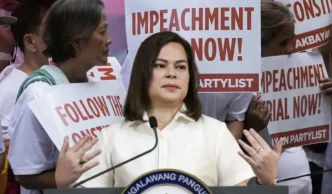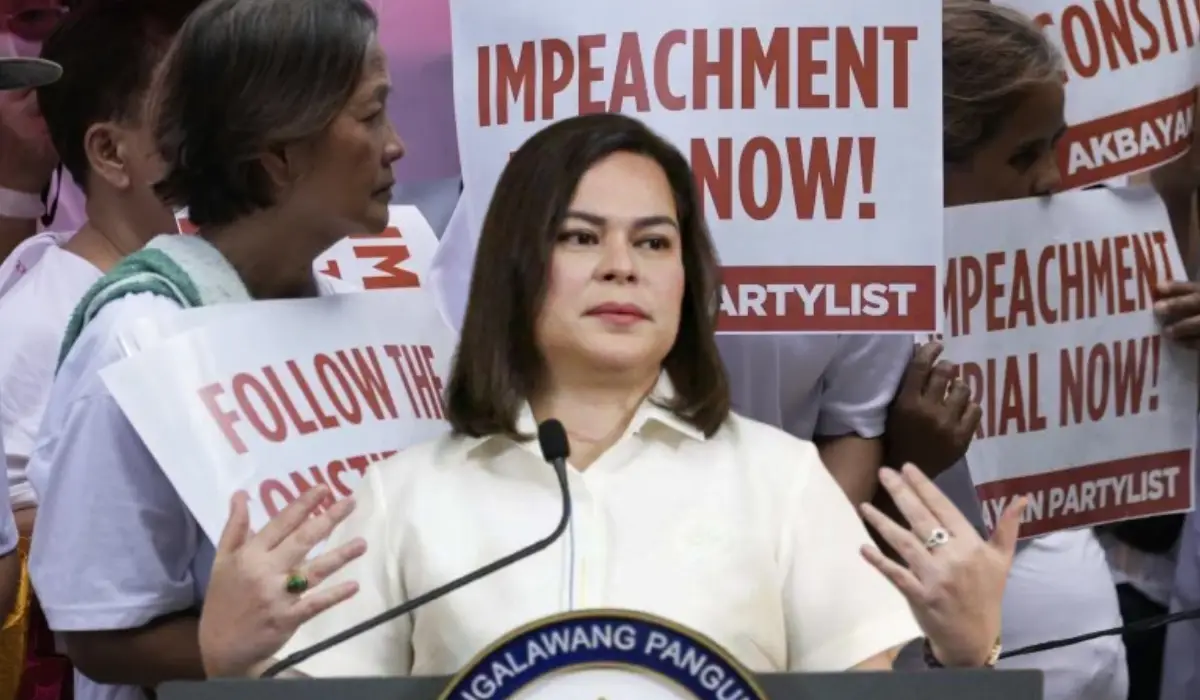In a striking display of public sentiment, a mural at the University of the Philippines in Quezon City, Metro Manila, calls for the conviction of Vice President Sara Duterte. Captured on June 3, 2025, the artwork symbolizes a growing wave of frustration among Filipinos as the Senate delays her impeachment trial, despite constitutional mandates and public demand for accountability. The trial, stemming from articles of impeachment transmitted by the House of Representatives, has become a lightning rod for debates over the rule of law in the Philippines, with implications for the country’s political stability and international reputation.
Impeachment Delays and Constitutional Concerns
The saga of Sara Duterte’s impeachment trial began months ago, following what many describe as one of the most divisive elections in Philippine history. Initially, Duterte challenged the Senate to proceed with the trial, famously predicting a “bloodbath” and casting herself as both a martyr and a defiant figure. Observers expected the Senate to act swiftly after the elections, especially since the excuse of campaign distractions no longer applied. Notably, Senator Imee Marcos had managed to hold multiple hearings during the election period without issue, undermining claims of logistical constraints.
Yet, as the Senate reconvened in early June 2025, new justifications for delay emerged. Some senators cited competing legislative priorities, a rationale that critics argue contradicts the Senate’s own rules. As outgoing Senator Aquilino “Koko” Pimentel emphasized, impeachment proceedings must take precedence over other matters to ensure that high-ranking officials are not left in prolonged uncertainty. A swift resolution, he argued, allows an acquitted official to resume duties without undue disruption.
The situation grew more contentious when senators aligned with Duterte, including Ronald “Bato” dela Rosa, openly discussed dismissing the trial altogether. Dela Rosa, who claimed responsibility for a resolution to halt proceedings, reportedly secured enough support among colleagues to potentially block a conviction. This move, however, raised immediate questions. If Duterte’s allies are confident in her innocence and hold sufficient sway in the Senate, why resist a formal trial? Critics, including legal scholars, point out that such actions undermine the very principles of transparency and accountability that Dela Rosa himself once championed in other contexts.
Public Outrage and Shifting Political Winds
The attempt to sidestep the trial has not gone unnoticed by the Filipino public. Recent surveys, conducted by multiple independent organizations in June 2025, reveal that a supermajority of citizens want Duterte to face the impeachment proceedings. The public’s frustration is palpable, with many viewing the Senate’s hesitation as a betrayal of democratic norms. Protests and symbolic gestures, like the mural in Quezon City, reflect a broader sentiment that the institution itself is on trial for failing to uphold constitutional duties.
Some senators have taken note of the shifting public mood. Sherwin Gatchalian, a known supporter and donor to Duterte’s campaign, recently urged his colleagues to proceed with the trial as a matter of constitutional obligation. Similarly, Joseph Victor “JV” Ejercito called for action, though he framed his argument within the context of competing national priorities. Ejercito highlighted pressing issues such as infrastructure, energy, and agriculture, suggesting that the Philippines risks falling further behind regional neighbors like Vietnam and Indonesia if these challenges are not addressed urgently.
While economic concerns are undeniably critical for many Filipinos, critics argue that Ejercito’s framing presents a false dichotomy. The Senate, they contend, is fully capable of managing both legislative responsibilities and quasi-judicial duties like an impeachment trial. Historical precedent supports this view, as past Senates have juggled multiple high-stakes tasks without sacrificing efficiency.
Rule of Law and Economic Implications
Beyond the immediate political drama, the impeachment saga underscores a deeper crisis in the Philippines: the erosion of the rule of law. Over the past decade, the country has struggled to attract high-quality foreign investment, a key driver of inclusive development. Analysts point to a pervasive sense of lawlessness and political unpredictability as major deterrents. High-profile incidents, including thousands of extrajudicial killings—some involving foreign businessmen—have tarnished the nation’s image, evoking comparisons to unstable “banana republics.”
While corruption is a shared challenge across Southeast Asia, neighboring countries often offer a more predictable environment for investors. In contrast, the Philippines’ political landscape remains uniquely volatile. Duterte herself has contributed to this perception, having made controversial statements that stand out even in a region accustomed to colorful politics. Her alleged threats against the President, as reported widely in local media, are cited as unprecedented for a sitting vice president, not just in Southeast Asia but globally.
The failure to address impunity, particularly under the long shadow of the Duterte family’s influence, risks further isolating the Philippines economically. Even as the Senate debates new legislation to bolster infrastructure or energy sectors, investors remain wary. Without a clear commitment to legal accountability—starting with a transparent impeachment process—experts warn that the country could slide further down the regional pecking order, potentially joining the ranks of so-called “Fourth World” nations, a term used to describe economies with persistent structural failures.
Duterte’s Political Legacy at Stake
Sara Duterte’s political future hangs in the balance as the impeachment controversy unfolds. Her initial defiance, framed as a willingness to face a “bloodbath” in the Senate, resonated with some supporters who view her as a victim of political persecution. Yet, the apparent reluctance of her allies to allow the trial to proceed has muddied this narrative. If her camp truly believes in her innocence, as they publicly claim, a trial could serve as a platform for vindication. Instead, moves to derail the process have fueled speculation about hidden vulnerabilities, weakening the Duterte camp’s assertions of a decisive electoral mandate.
The broader Duterte legacy, tied to her father Rodrigo Duterte’s controversial presidency, also faces scrutiny. The family’s political dominance over the past decade has been marked by allegations of human rights abuses and governance failures, issues that continue to polarize Filipino society. Sara Duterte’s handling of the impeachment crisis—whether through confrontation or evasion—will likely shape public perceptions of this legacy for years to come.
Regional Context and International Observers
The Philippines’ political turmoil does not exist in a vacuum. Across Southeast Asia, governments and civil society groups are watching closely, aware that the outcome of Duterte’s trial could set precedents for accountability in the region. In countries like Thailand and Indonesia, where political elites often face allegations of corruption or abuse of power, the Philippine case serves as a litmus test for democratic resilience. International human rights organizations have also weighed in, urging the Senate to uphold constitutional norms and ensure a fair process, regardless of the trial’s outcome.
For the United States and other Western partners, the situation poses diplomatic challenges. The Philippines remains a key ally in the Indo-Pacific, particularly amid rising tensions with China in the South China Sea. However, ongoing concerns about governance and human rights under successive administrations, including the Duterte era, complicate bilateral relations. A transparent impeachment process could signal a renewed commitment to democratic values, potentially strengthening ties with democratic partners. Conversely, further delays or dismissals risk reinforcing perceptions of systemic impunity.
A Nation at a Crossroads
As the Senate deliberates its next steps, the eyes of the nation—and the world—remain fixed on Sara Duterte’s fate. The impeachment trial is more than a legal proceeding; it is a referendum on the Philippines’ commitment to the rule of law and its aspirations for a stable, prosperous future. Public sentiment, as captured in surveys and street art alike, demands accountability, while economic realities underscore the urgent need for political predictability to attract investment and drive growth.
For now, the mural at the University of the Philippines stands as a powerful reminder of the stakes involved. Whether the Senate will heed the call for justice or continue to stall remains an open question, one that could define the trajectory of Filipino democracy for a generation.
















